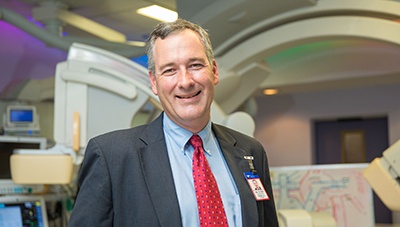
Edward Tuohy, MD
Q: How is TAVR performed?
During a TAVR procedure, an interventional cardiologist and a cardiothoracic surgeon work together in a cardiac catheterization laboratory or a special hybrid operating room with built-in imaging equipment. Typically, a small plastic tube is placed into the femoral artery in the patient's groin and moved through the patient's arterial system, the blood vessels that carry blood from the heart to the organs. It is delivered to replace the existing valve much like a coronary stent. It does not require a heart-lung bypass machine or even general anesthesia. Other arteries can be used if the femoral arteries are too small or blocked.
Q: Can a valve be repaired in other ways?
Valves can be placed by surgical aortic valve replacement, or SAVR.
Q: What are the advantages of TAVR over surgical aortic valve replacement?
TAVR has many advantages over SAVR, especially in older or other high-risk patients. TAVR is much less invasive, it avoids cardiopulmonary bypass and general anesthesia, and it has a shorter hospital stay and faster recovery. Most of our TAVR procedures use femoral artery access, which allows next-day discharge in some cases and much quicker recovery after a procedure.
Q: What are the causes of aortic valve disease?
Aortic valve disease largely occurs with age. The same risk factors for coronary artery disease can predict aortic valve disease as well. One of the most common valve problems is caused by a congenital heart defect called bicuspid aortic valve, where the aortic valve can become blocked or leaky 20 to 30 years earlier than in healthy individuals.
Q: How can those causes be prevented?
A healthy lifestyle is the best way to avoid any heart disease —a good diet, exercise, avoiding tobacco use and paying careful attention to blood pressure and cholesterol. When risk factors for an abnormal heart valve are identified early, interventions and early treatment offer better outcomes.
Q: What does the future look like for TAVR at Bridgeport Hospital?
The future for TAVR is very bright. The hospital is building a special hybrid operating room that will allow Bridgeport physicians to perform more procedures. We will also be able to perform more complex TAVR procedures, as well as other noninvasive heart valve treatments.

